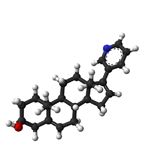ASCO: Adding Abiraterone to Leuprolide Before Prostatectomy Can Eliminate Tumor in Some Men With High-Risk Prostate Cancer
Results from a randomized phase II study show that 6 months of treatment with abiraterone (Zytiga), in addition to the hormone therapy leuprolide before prostatectomy, resulted in complete response and near-complete response in one-third of men with high-risk prostate cancer.
In one of the most talked-about sessions from this year's annual meeting of the American Society of Clinical Oncology (ASCO), Mary-Ellen Taplin, MD of the Dana-Farber Cancer Institute presented the results from a randomized phase II study showing that 6 months of treatment with abiraterone (Zytiga) in addition to the hormone therapy leuprolide before prostatectomy resulted in complete response and near-complete response in one-third of men with high-risk prostate cancer.[1]

Chemical structure of abiraterone
Taplin says that “twenty percent of patients with prostate cancer are diagnosed with very high-risk prostate cancer … and those patients have very poor prognosis with standard therapy, radiation, and prostatectomy, so having a systemic therapy that can increase the cure rate for these patients is an unmet need in oncology.”
In the study, 58 men who had had three or more positive biopsies and a Gleason score of 7 or higher, were T3 grade, and had PSA levels of 20 ng/ml or greater were randomized to either leuprolide alone or leuprolide and abiraterone for the 3 three months of the study. Biopsies were then performed on the men and tissue hormones were measured, as a primary endpoint. After the first 3 months, patients received 3 additional months of both abiraterone and leuprolide, and then underwent prostatectomy.
VIDEO
Mary-Ellen Taplin, MD discusses the phase II trial results and implications
A secondary endpoint for the study was the pathologic staging, and Taplin and colleagues found that 34% of the patients who received 6 months of abiraterone and leuprolide either had no tumors, or only very small tumors (1 mm to 4 mm) remaining. “These were patients who had very bulky local tumors, so to have that amount of shrinkage was remarkable,” Taplin noted. “In addition, the hormone levels at three months show that abiraterone was really getting into the tissue and meeting its target. The levels of DHT and DHEA in particular were much lower than in the patients who were just on leuprolide.”
Taplin went on to say that clinicians have this idea that the majority of patients respond really well to hormonal therapy, and they believe this because the PSA levels of these patients are reduced to very low levels. She noted that that was also the case in this study, however “when you looked at the pathology, about a third of the patients had a remarkable response to hormone therapy, and the other patients still had quite a bit of disease.” They still had stage T3, and they were still lymph node–positive. “We were kind of wowed by the number of patients who, despite having a PSA of zero, had T3 or node-positive disease.”
She theorizes that in these patients there is most likely an inherent resistance to hormone therapy, and says that her group will do whole-exome sequencing from the tumors on the patients to try to understand how they might be genetically different.
As far as toxicities, Taplin says that the combination of abiraterone and leuprolide was quite well tolerated, and there were no grade 4 toxicities. There were some elevated liver function tests, which is a known side effect of abiraterone (roughly 7%), all of which were reversible when abiraterone was stopped, and that there was hypokalemia in about 3% to 7% of patients.
Taplin noted that in this study they reported “near complete” responses (which is not a valid endpoint for a study in prostate) because “the patients had such unfavorable high-risk disease that if they went from having T3 disease, Gleason 9, down to having 2 mm or less on a prostatectomy specimen, we thought that was worth noting.” She went on to say that “If we had just reported the complete response rate, which was ten percent in the six-month abiraterone group, we thought it would underrepresent the responses that were seen.”
Reference
1. Taplin ME, Montgomery RB, Logothetis C, et al. Effect of neoadjuvant abiraterone acetate (AA) plus leuprolide acetate (LHRHa) on PSA, pathological complete response (pCR), and near pCR in localized high-risk prostate cancer (LHRPC): Results of a randomized phase II study. J Clin Oncol. 2012;30:(suppl; abstr 4521).
